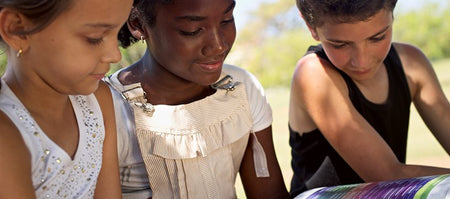- Demonstrate confidence in our students. If we are convinced that our students will succeed and we consistently communicate our belief in them and their capacity to be successful, our confidence will “rub off.” It is much easier to take risks when important people around us are confident that we will succeed.
- Focus on small successes. Confidence grows with successful experiences. Learning activities at which students can succeed can get them started. We can also design these activities to tell us what students know and may be ready to learn next.
- Set goals with students. Conversations about goals can offer great opportunities to share our confidence and challenge students to reach higher. If students feel as though they are part of the goalsetting process, they are also more likely to take ownership and make greater efforts to succeed. As goals are met, we can reinforce with students their capability and potential.
- Coach students to recall and recount their successes. Confidence grows as we feel successful. Self-talk plays a key role in how successful students feel. By coaching students to remember and relive their successes, they can counter negative, confidence-undermining narratives. Of course, they occasionally need us to point out and remind them of their successes and areas of strength.
- Discourage students from comparing themselves and their performance with others. Comparisons to others who may be moving faster or doing better can undermine confidence even though another student may be in a very different situation. What matters most is for the student to concentrate on his or her own learning and progress. It is also the only element students can control.
- Remind students that effort and occasional struggle are an important part of learning. In fact, learning that comes easy is often forgotten just as easily. When students have to concentrate and make multiple attempts, we can remind them that they are experiencing a natural part of the learning process.
- Enlist students in keeping track of their progress. When students submit assignments, turn in tests, and complete assessments solely for our attention and recording, it can be easy for them not to be aware of their progress. Yet, documenting and tracking progress can be highly motivating and confidence-building. We can design monitoring tools and strategies that position students to monitor their progress, in addition to our records. This information also can be helpful when progress begins to slow, and students need additional coaching and nudging to get back on track.
Latest Posts

In Your Corner, Student Learning
Overcoming a Crisis in Confidence
The coming weeks are a crucial time for learning. We want students whose learning has lagged over the past months to catch up. The end of the year will soon be here and expectations for learning growth for many students have not been met. Special efforts are underway to accelerate learning and ensure that students gain the skills and learn the content they will need when school opens again in the fall. For many, this summer will be a time for classes and study rather than leisure and relaxation.
Yet, aiming our focus on instruction and content coverage alone will not be a recipe for success. Regardless of how diligently we teach, students must be ready to learn. They are a key piece of the success puzzle. Certainly, many students who have been learning remotely are ready to return to in-person learning and engage in whatever learning lies ahead.
At the same time, a large group of students have found learning during this past year to be more difficult than in previous ones. They struggled to focus and had difficulty sustaining learning efforts, especially when they felt stuck. Too often they did not have the learning support that used to sustain them when they struggled. Their grades have fallen and, in some cases, they face the possibility of failing.
As adults, we can see that the learning conditions they’ve faced have likely contributed heavily, if not fully, to the situations in which these students find themselves. For students, the situation is not necessarily as clear. As a result, many have come to doubt their learning potential and skills. What used to come fairly easily no longer does.
What has been lost is their confidence. With loss of confidence comes greater reluctance to take learning risks. Why try if failure is the likely outcome? Learning persistence also dissipates with loss of confidence. Why continue to struggle if I do not believe I will succeed? It can be less painful to be chided for not trying than to be exposed as not capable. What these students face is as much a crisis in confidence as a crisis in learning.
What can we do to help students rebuild their confidence and move past this crucial learning barrier? Here are seven strategies to tap:

In Your Corner, Student Learning
Time for Renewing Relationships and Making New Connections
It may seem strange to be thinking about relationships and connections at this time of the year, but this is not a normal year. It’s true that the end of the school year is not that far away. Normally, our focus might be on sustaining the momentum we have built with students over the course of many months together. We might be planning special events and breaks in routines to create excitement and build motivation for the final push.
Yet, this is a time when many students are returning from months of remote and hybrid learning. They are navigating changing learning environments. They may be meeting classmates in person for the first time all year. Many students are nervous about once again learning in the physical presence of others. Some are likely wondering whether they will fit in, if they will still be friends with classmates from the past, and if their learning is on pace to be successful as they return to in-person learning.
These are issues that we should not ignore in our efforts to address areas and aspects of academic learning that have lagged for many students. We are not likely to achieve success with students if they are not feeling comfortable with peers, confident in their relationships, and assured of our care and support for them.
As much as we might be tempted to press forward in our efforts to address missing skills and shore up areas of weakness, we need to make it a priority to address emotional needs and build connections with and among our students if we hope to have a successful ending to the year. Here are five ideas and activities you can use to create the conditions and culture your students need to do their best learning now.
If your students are returning to in-person learning after being physically separated, use icebreakers to initiate personal conversations and share stories. The icebreakers might involve recounting experiences while remote learning, sharing hopes and concerns regarding the return to face-to-face classes, discussing plans for new activities and opportunities that lie ahead, or other topics that will build connections among students. As students learn more about each other, friendships will form and renew, and feelings of connectedness will emerge. Importantly, creating time for and facilitation of these activities will also communicate to students that their feelings and experiences matter to you.
Take time to connect personally with each student. It may be a warm greeting upon entry to the classroom, a comment about something they shared during an icebreaker, or something positive you have noticed. The key is to communicate that you notice and care about the student as a person. The more you notice and communicate your interest and support, the more comfortable and connected your students will feel.
In the coming weeks, carve out time to engage in conversations with your students about their transitioning experience as it unfolds. Your interest in their experiences will further communicate that you care. Equally important, you may learn about challenges and barriers students are facing that you may not have been aware of or considered. Alternatively, you can receive feedback on what is working well and might be expanded to successfully move the process along. Be alert for students who do not share or who make superficial contributions. It may be that there is more to learn from these students, but they are reluctant to speak in a group setting. A brief follow-up check-in may be what is needed.
Look for opportunities to give students responsibilities and opportunities to lead activities within the classroom. Whether taking digital notes to share with the class, being a timekeeper for small group discussions, summarizing a discussion, or other activities, the more students share in the operation of the class, the more ownership and connectedness they are likely to experience. Feeling needed, having responsibilities, and being a part of something larger than ourselves can be highly motivating and build strong connections.
Be alert to the activities, engagements, and successes of students beyond the classroom and let students know you notice. The pandemic may still be limiting some opportunities for students, so the more you notice and comment on, the more meaning your attention will carry. Sending a short note, text, or email or making a brief verbal comment is all it takes. You will be communicating that you notice and you care. There are few messages that are more powerful.
Share Your Tips & Stories
Share your story and the tips you have for getting through this challenging time. It can remind a fellow school leader of something they forgot, or your example can make a difficult task much easier and allow them to get more done in less time. We may publish your comments.
Send Us An Email













